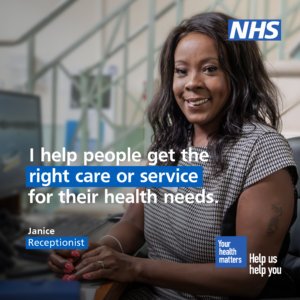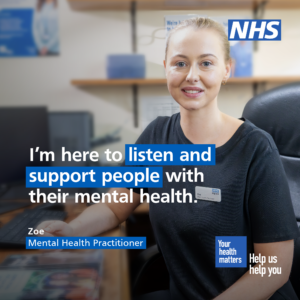Primary Care: Meet your General Practice team
Primary care services pro vide the first point of contact in the healthcare system, acting as the ‘front door’ of the NHS. Primary care includes general practice, community pharmacy, dental, and optometry (eye health) services.
vide the first point of contact in the healthcare system, acting as the ‘front door’ of the NHS. Primary care includes general practice, community pharmacy, dental, and optometry (eye health) services.
As part of General Practice, there are people working in a number of different roles alongside GPs that can all help you with your needs. Together they can get you the right care from the right healthcare professional as quickly as possible.
In addition to GPs, general practice teams can include nurses, physiotherapists, clinical pharmacists, mental health practitioners, paramedics, social prescribers, and health and wellbeing coaches.
If you need to see a GP you will always be offered an appointment, but there may be other health professionals who can provide the most appropriate support.
Below we feature just some of the roles within your general practice team, who are here to help you.
Care Navigators
Care navigators work as part of the reception team, right at the front door, and have been introduced to help assess, prioritise, respond and assist to patient’s needs.
Successful care navigation can help direct 40% of requests more effectively and speeds up appointments for those who need them.
Care navigators can help by:
- Directing patients to professionals within the general practice team or other medical professionals such as community pharmacists who can best meet the needs of the patients.
- Asking for more information about why you are calling, care navigators can ensure you see the right person for your condition as quickly as possible.
Social prescribing link worker
Social prescribing link workers connect people with local community activities and services that can help improve health and wellbeing.
An important part of their role is to build relationships with the people they are helping by listening carefully to what is important to them and what motivates them.
Social prescribing link workers can help by:
- supporting with issues that are affecting your health and wellbeing.
- providing advice and support on social issues.
- linking people into local services, groups and activities.
Clinical Pharmacist
Clinical Pharmacists have expert knowledge of medicines and health. Pharmacists unique expertise and knowledge makes them essential members of the healthcare team.
Clinical pharmacists can help by:
- giving advice and information about your health and minor ailments.
- supporting you to manage and get the best from the medicines you are on.
- supporting you to manage long term conditions.
Physiotherapist
Physiotherapists work on identifying and maximising movement to improve health and wellbeing. They can recommend exercises and use ultrasound equipment to help diagnose problems and determine the most appropriate treatment plan.
A physiotherapist can help by:
- Diagnosing and treating muscular and joint conditions.
- advising on how to manage your condition.
- referring you to specialist services if you need them.
Mental health practitioner
Mental health practitioners provide expert support to offer patients faster access to specialist mental health support through their local General Practice team.
Mental health practitioners can help by:
- Having longer appointment times to help support patients.
- Supporting the management of people with mental health conditions closer to home
- Quicker access to expert support.

